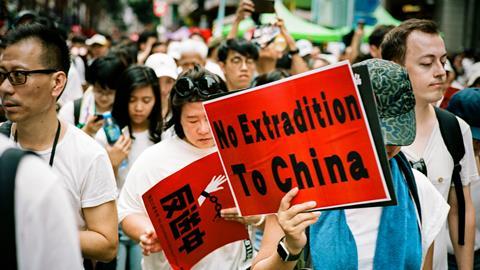On Saturday Hong Kong’s chief executive, Carrie Lam, announced that the government would suspend debate about a hugely controversial change to extradition laws. This led to massive protests involving hundreds of thousands of people taking to the streets. Some reports have placed the numbers of protesters in excess of a million people which, when you consider the population of Hong Kong is only 7.4m, is truly extraordinary.
The situation is far from resolved. Fearful of the protests spiralling further out of control, the government has chosen to park the debates for the current time. However, opponents of the bill are still dissatisfied, and even more people have taken to the streets again since the weekend. The organisers have threatened continued protests unless, and until, the government take the deal permanently off the table.
To understand the situation one must first understand the unique position of Hong Kong itself. It was first colonised by the British in the 19th century and developed a thriving economy initially in manufacturing and later as a global financial centre and shipping hub.
Following an agreement in 1984, Hong Kong was formally handed back to China in 1997 under the constitutional principle of ’one country, two systems’. Put simply: Hong Kong was returned to China but at the same time retained its own legal and legislative system, with its people being guaranteed rights and freedoms for 50 years. Judicial independence is a key plank of the system. Formally, Hong Kong exists as a special administrative region of China.
The handover has not been without difficulty, with many fearing that China is exerting increasing pressure and control on the region, and placing the freedoms and way of life that its citizens currently enjoy at risk.
In today’s society, with easy international travel, extradition has become an essential tool for law enforcement bodies worldwide. The lack of any arrangements between Hong Kong and mainland China seems like an extraordinary anomaly and one that poses a potential security risk to both Hong Kong and China. Hong Kong has entered into extradition agreements with 20 countries, including the UK and the US, but no such agreements have been reached with mainland China despite ongoing negotiations since 1997.
The fundamental issue is China’s appalling record on human rights and justice. It is often said that extradition is based upon the principle of comity and mutual trust between nations. The differences between the two systems are stark to say the least. Human Rights Watch describes China as, 'a one-party authoritarian state that systemically curbs fundamental rights.’ Torture in custody remains commonplace.
Documents from the time of the negotiations over the handover reveal the UK government’s position at the time with regards to any extradition agreement: ’It is government policy to only enter into extradition arrangements with governments whose judicial system, penal conditions, human rights standards are of an acceptable level.’ China’s record on human rights and justice has not improved since the 1990s and many observers fear that it may have deteriorated. Again, Human Rights Watch observes that, ’since President Xi Jinping assumed power in 2013, the government has arbitrarily detained and prosecuted hundreds of activists and human rights lawyers and defenders. It has tightened control over nongovernmental organizations, activists, media, and the internet through a slew of new laws that cast activism and peaceful criticism as state security threats.’
The latest proposals for an extradition deal with the Chinese mainland stem from a case in which a man is alleged to have murdered his pregnant partner in Taiwan before fleeing home to Hong Kong. He is currently in custody in Hong Kong on other charges and due to be released in October. In the absence of any extradition arrangement (Taiwan is regarded as part of China by both its own government and Beijing), the Hong Kong authorities have said that they are unable to return the suspect. Beijing is therefore seeking to use this emotive case to push through an extradition deal.
Under the proposals, any extradition request would be reviewed by the courts but the final decision on extradition would be taken by Hong Kong’s chief executive. The politicization of the process has many worried that Beijing will be able to exert considerable pressure. The chief executive is appointed by a Beijing controlled committee, and under the constitution of Hong Kong, the chief executive is deemed to be accountable to Beijing.
Opponents of the bill see this case as a smokescreen for Beijing’s broader agenda. Put simply, the protestors are fearful that the law will be used to target political opponents and dissidents - many of who have fled mainland China to Hong Kong. In recent years there have been several cases of ‘disappearances’ of opponents to Beijing from Hong Kong often followed by ‘confessions’.
It has been argued, in favour of the agreement, that placing matters on a formal footing with judicial control is preferable to the current situation. Despite a dearth of extradition agreements worldwide, numerous high profile targets have come into the Chinese authorities' clutches in recent years. Many have questioned why it is that so many fugitives have ‘voluntarily’ returned to China after a conversation with the authorities. There are suspicions that pressure and threats to family members are a routine tool of the Chinese authorities and the protesters believe that any extradition agreement would be manipulated in politically motivated abusive requests.
One thing is for sure, this is not a straightforward situation for the Hong Kong authorities. Withdraw the bill and face further pressure from Beijing. Pass the bill and risk widespread public disorder on a scale not seen for decades.
Thomas Garner is an extradition lawyer at Gherson Solicitors.
































5 Readers' comments